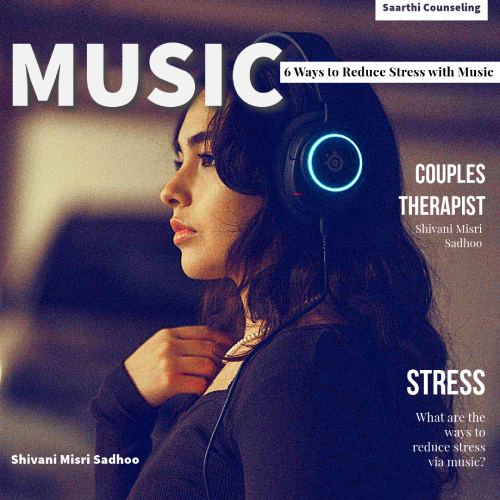In the relentless hustle and bustle of modern life, stress has become an unwelcome companion, lurking in the shadows of our daily existence. Although a certain level of stress is a natural response to life’s challenges, prolonged exposure to its strains can have detrimental effects on both our physical and mental well-being. Fortunately, one harmonious remedy exists in the form of music—a therapeutic symphony that has the power to alleviate stress and restore balance to our hectic lives.
What is Stress? Stress, the feeling of being overwhelmed or unable to cope, impacts our mind and body. It triggers the release of hormones like cortisol, the stress hormone, raising heart rate and blood pressure.
Whether it’s the soothing cadence of classical compositions or the upbeat tempo of jazz, immersing oneself in music offers a temporary reprieve, allowing the mind to recalibrate and recharge. Scientifically, music has been shown to stimulate the release of dopamine, the brain’s “feel-good” neurotransmitter. This surge in dopamine not only uplifts the mood but also counteracts the negative impact of stress hormones, promoting a sense of well-being.

What are the ways to reduce stress via music?
Leading psychologist and relationship counselor Shivani Misri Sadhoo explains how music can help in stress management. Some of these ways are.
The Power of Music and Meditation
Did you know that meditation, an ancient tradition practiced worldwide, can be enhanced by incorporating music? Meditation aims to focus, center, and calm the mind, benefiting mental and physical health.
Pairing meditation with slow-tempo music can lower heart rate, anxiety, and stress levels. Guided meditation, featuring a narrator with positive affirmations, is another approach. The combination of meditation and music offers a holistic way to relax the body and mind, making it a popular choice for many seeking tranquility and well-being.
Music has a calming effect
The central nervous system has two parts: sympathetic (fight or flight) and parasympathetic (rest and digest), both working automatically. In stress, calming down can be tough. Deep breathing helps activate the parasympathetic system for relaxation.
A study suggests that certain music can also quickly reengage the parasympathetic system after elevated heart rate situations, such as post-exercise. So, music might be a handy tool for grounding and relaxation in stressful moments.
Opt for music sans lyrics
Have you ever wondered if certain types of music are better at reducing stress? Research suggests that instrumental music, like classical and ambient genres, is effective. Lyrics in music might be distracting rather than calming.
Instruments like Native American, Celtic, and Indian stringed instruments, drums, and flutes are known to relax the mind. Even rain, thunder, and nature sounds, combined with light jazz or classical music, can have a soothing effect. Choosing music without lyrics is often recommended for stress reduction.
Customised Playlist
Music has the remarkable ability to evoke emotions and memories. Creating personal playlists can relieve stress by allowing individuals to curate a collection of music that resonates with their emotions and preferences. The act of selecting familiar and comforting songs provides a sense of control and escapism.
For example, a calming playlist with acoustic melodies can soothe nerves, while an energetic playlist with upbeat tunes may boost mood. This personalized auditory experience promotes relaxation, reducing stress as individuals immerse themselves in a musical world tailored to their emotional needs.
Practice Active Listening
Engage in active listening by disconnecting from all gadgets and closing your eyes to enjoy some quality music. Instead of treating music as mere background noise, practice active listening. Set aside dedicated time to sit or lie down, close your eyes, and fully immerse yourself in the music.
Pay attention to the nuances, instruments, and lyrics. Allow the music to envelop you, creating a mindful and meditative experience. Active listening not only deepens your connection with the music but also offers a refreshing respite from daily demands, reducing stress and fostering a sense of calm.
Practice Playing An Instrument
Learning to play an instrument, like the piano or guitar, is a rewarding journey. Playing music engages various parts of your brain, making it a mega-vitamin for your mind. This hobby not only offers an emotional outlet but also a focused and meditative experience. As you advance, the joy and accomplishment counteract daily stresses.
Music has the power to shift moods and thought patterns, positively impacting your overall well-being. So, pick up an instrument and embark on a fulfilling musical adventure for a healthier mind and soul.
Incorporating music into stress management practices, such as meditation and deep breathing, provides a powerful tool for relaxation. Choosing instrumental genres, creating personalized playlists, and actively listening to music offer diverse avenues to alleviate stress. Additionally, engaging in the art of playing an instrument not only fosters a meditative experience but also contributes to overall mental well-being.

Shivani Misri Sadhoo is an internationally recommended relationship Counsellor by world’s biggest and most trusted study and research-based foundation for couples therapy – Gottman Institute. She is trained on specialised key relationship counselling Skills from AIIMS, VIMHANS and various other reputed institutions. Counselor Shivani Misri Sadhoo, is also Certified for Emotionally Focused Therapy, Cognitive Behavioral Therapy and Dialectical Behaviour Therapy.
Counsellor Shivani Misri Sadhoo is also a Certified Neuro Linguistic Practitioner with specialised training and experience in the field of affairs/betrayals, trust issues, difficulty communicating, conflicting values, bereavement, grief and loss (affairs, separation, divorce, childhood) and emotional health issue (anxiety, social anxiety, fear, depression, low mood).
Currently, Shivani Misri Sadhoo is one of the top counsellors with the HIGHEST Success Rate with over 17,000 happy couples and individuals (based in India and abroad), who has benefited from her therapy. Psychologist and Counselor Shivani Misri Sadhoo not only practice independently from her clinic in Greater Kailash, Delhi, India but also listed on the panel of eminent hospitals like IBS Hospital – Institute of Brain & Spine, Express Clinic, Fortis (formerly) based in Delhi.



